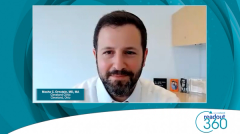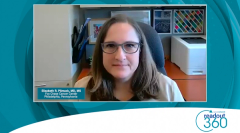
Frontline IO-Based Regimens in Sarcomatoid or Rhabdoid Metastatic nccRCC
Centering discussion on sarcomatoid and rhabdoid non-clear cell renal cell carcinoma, panelists consider frontline IO-based regimens and their value in this setting.
Episodes in this series

Transcript:
Brian I. Rini, MD, FASCO: So...maybe the last data set that we’ll talk about—I believe this is from ASCO [American Society of Clinical Oncology]—was looking at immune-based regimens. This is an IMDC [International mRCC Database Consortium] study that has, as you all know, a large database started now…15 years ago by [Daniel] Heng[, MD]. It has grown to be...a giant RCC [renal cell carcinoma] database called IMDC. Chris Labaki[, MD,] looked at first-line immune-based regimens in patients with sarcomatoid and/or rhabdoid non–clear cell kidney cancer. So it takes a large database like this because non–clear cell is rare, and then obviously, as we touched on a little bit, sarcomatoid or rhabdoid is a rare subset. So what was looked at was...first-line IMDC nonnuclear cell with sarcomatoid and/or rhabdoid features, presumably from a local path [pathology] report. There’s certainly no central path review.
And then [they] looked at immune-based regimens that we talked about, the doublets, ipi/nivo [ipilimumab/nivolumab] or IO [immuno-oncology] TKI [tyrosine kinase inhibitor] regimens, or TKI monotherapy sunitinib or pazopanib as in the old days, so to speak. And then [they] looked at survival and response rates and time to treatment failure, which is...a proxy for PFS [progression-free survival], which is a little hard to capture in this kind of database, and then [they] did a multivariable analysis adjusting for known factors to look at outcome. So what you see in this non–clear cell subset, if you look at the sarcomatoid [group], you see greater enhanced OS [overall survival], if you will, compared with VEGF-targeted therapy in this sarcomatoid/rhabdoid [group]. And this is not surprising. We know from many, many data sets and subsets of phase 3 [trials] and retrospective analyses that there’s something about sarcomatoid kidney cancer that is more immune responsive.
There [have] been gene expression studies that have shown that it tends to be more PD-L1 positive, for whatever that’s worth. And that’s not true in nonsarcomatoid, where there’s an advantage to IO-based regimens, as you might imagine, that’s been shown across trials, but it’s not as dramatic as in the [population with] sarcomatoid and rhabdoid disease. So maybe just to touch on this, Betsy.... I’ll start with you. [First], should we be lumping sarcomatoid and rhabdoid together? I don’t know that they’re the same biology. And are these data valuable to you, [does] this influence your choice of regimen, or is it trying to confirm that sarcomatoid is more immune responsive?
Elizabeth R. Plimack, MD, MS: I’ll answer the second question first. It definitely confirms that sarcomatoid requires immunotherapy for the best outcome, and...we know that because fortunately, it was not only captured or enrolled into these large, randomized phase 3 trials that we just spoke about—CLEAR [NCT02811861], [KEYNOTE]-426 [NCT02853331], [CheckMate] 9ER [NCT03141177]—but also dissected in subgroup analyzes, which...are really important to do. So no, I don’t think it changes my practice. Rhabdoid vs sarcomatoid...is a bit in the eye of the pathologists as the beholder. Different people will call it differently in my experience, and I do clinically...lump them together. I’d be eager to hear what others do.
Brian I. Rini, MD, FASCO: Moshe, how about you?
Moshe C. Ornstein, MD, MA: Some of our pathology reports don’t always break it out as sarcomatoid with the percentage and rhabdoid with the percentage, but we’ll say sarcomatoid/rhabdoid features, present or absent, and what percentage. So...it probably is pathologist specific or institution specific in terms of what the framework, or what the template, for the pathology readout is. I tend to see them very much lumped together, and occasionally they are broken out, but I generally will treat them similarly with an IO-based regimen.
Brian I. Rini, MD, FASCO: And Bob, anything to add about these data or about how you approach sarcomatoid/rhabdoid?
Robert J. Motzer, MD: No. Real-world data like [these]...if you see [them] and [they]...agree with the trial data or your own personal experience, then you say that [they are] confirmatory. And if [they don’t], then you say, well, [they’re] real-world data and [they’ve] got limitations. So...that’s...the quandary I’m in a little bit in terms of actually applying real-world data to practice.
Brian I. Rini, MD, FASCO: Yeah. And...that’s well said. We want what we do confirmed and when it’s not confirmed, we tend to ignore it. But...it’s hypothesis generating. And...these data to me make sense. I don’t think there’s anything that jumps off the page. Understanding the biology of sarcomatoid, and especially rhabdoid, which...we don’t have terrible biologic insights...into, is necessary.
Transcript is AI-generated and edited for clarity and readability.
Newsletter
Stay up to date on recent advances in the multidisciplinary approach to cancer.









































